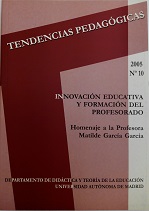The Department of Didactics and Theory of Education is committed to the inclusion of young people with intellectual disability in the Faculty of Teacher Training and Education of the UAM A training program for the labor insertion
Keywords:
Intellectual disability, Labour training, Labour inclusion, Job coach, Inclusion in the university environment.Abstract
The need of giving an answer with a specialized and inclusive education in the university environment, to the request of training for the employment of youth with intellectual disabilities, it has been the main reason that has drived this team ofteachers of the Autónoma University of Madrid and the Prodis Foundation to design an Educational Program for Labour Integration.
Nowadays the right to work of the people with intellectual disabilities is an undeniable fact. Nevertheless, the right to have an education after finishing the compulsory education has not still become a general fact. Because ofthis, the Prodis Foundation and the General Foundation of the Autónoma University of Madrid have signed an agreement, thanks to which a group ofsixteen youngpeople with intellectual disabilities has started a Training Course for Labour Integration, in the Faculty of Teacher s Training and Education of the Autónoma University of Madrid, with two years of duration. This course is part ofa research that it is being carried for teachers ofthe Autónoma University ofMadrid, the UNED (Open University) and the Pablo Olavide University of Sevilla. This experience is being very satisfactory and has important future perspectives. The professionals members ofthis research team belong to the Teaching and Theory ofEducation Department. They are very prestigious teachers in different areas such as integration, special education, intellectual disability, teaching and organization, new technologies and research methods( Asunción Camina, Rosario Cerrillo, Inmaculada Egido, Melchor Gómez, Agustín de la Herran, Dolores Izuzquiza, Sara de Miguel, Gloria Pérez Serrano, Martina Pérez Serrano, Rosa Rodríguez, y Raquel Ruiz. The main objective ofthis Program is to improve the life quality of young people with intellectual disability through their right to an education in the university environment before being employed. This training will allow them to perform a rewarding job for themselves and also for the society. The expected objectives of the teaching and research team, through the implementation of the Training Program for Labour Integration for youth with intellectual disabilities ofthe Autónoma University of Madrid are the following: 1. To perform a quality research that identifies the training needs ofyoung people with intellectual disabilities to get a job in a company. 2. To design a new training model adjusted to their needs and orientated to the job market in cooperation with different companies and both, national and international institutions. 3. To create an specific study program that will allow the intellectual disable students to perform with satisfaction the required functions in the selected jobs. 4. To create an specific study program for the figure of the Job Coach, that will follow up and support the employee through labour life in the company. 5. To create a Labour Integration Support Centre whose main objective is to maintain the employees in their jobs through a continuous education, using as a reference the life long learning models. 6. To contribute to the "Practicum" ofthe Teacher Training and Psycho-pedagogy students from the Education Faculties, through their participation in training courses and the work that takes place in the Labour Integration Support Centre. Tendencias Pedagógicas 10, 2005. 51 Dolores Izuzquiza Gasset 7. To spread this training model and the different work experiences carried out in various companies.
Downloads
References
Instituto de Migraciones y Servicios Sociales (2000). Base de datos estatal de personas con discapacidad. Madrid: IMSERSO.
Jenaro, C., Mank, D., Bottomley, Jy Doce,S. (2002). Supported employment in the intemational context. Jal 01 Vocational Rehabilitation. 17, 5-21.
Jordán de Urríes, B., Verdugo, M. y Vincent, R. (2005). Análisis de la evolución del empleo con apoyo en España. Madrid: Real Patronato sobre Discapacidad.
Ministerio de Trabajo y Asuntos Sociales. Documentos 59/05.
Jordán de Urríes, B.y Verdugo, M. (2003). El empleo con apoyo en España. Análisis de las variables que determinan la obtención y mejora de resultados en el
desarrollo de servicios. Madrid: Real Patronato sobre Discapacidad.
Mank, D. (2003). Síntesis de una serie de investigaciones sobre la "tipicidad», los apoyos de compañeros de trabajo y los resultados de calidad del empleo con apoyo. M.A. Verdugo, y F.B. Jordán de Urríes (Coords.), Investigación, innovación y cambio (pp. 169-192). Salamanca: Amarú Ediciones.
Mank, D., Cioffi, A. y Yovanoff, P. (2000). Direct supports in supports in supported employment and its relation to job typicalness, coworker involvement and employment outcomes. Mtal Rretardation, 38 (6), 506-516.
Plan de Acción para las Personas con Discapacidad de la Comunidad de Madrid 2005-2008.
R.D. 2271/2004, de 3 de diciembre, por el que se regula el acceso al empleo público y la provisión de puestos de trabajo de las personas con discapacidad. (B.O.E.
n° 303, de 17 de diciembre de 2004.
Verdugo M.A., y Jordán de Urríes, F.B. (Eds.). (2002). Hacia la integración plena mediante el empleo. Actas del VI Simposio Internacional de Empleo con Apoyo. Salamanca: Instituto Universitario de Integración en la Comunidad.
Verdugo, M.A., y Jordán de Urríes, F.B. (2001). Panorámica del empleo con apoyo en España. Madrid: Real Patronato sobre discapacidad. Wehman, P.y Bricout, J. (1999). Supported employment and natural supports: a critique análisis. E G. Revell, K. Ige, D. Mank y Whehman, P. (Eds). The impact of supported employmtfor people with significant disabilities. (pp. 1-24).
Richmond, VA: VCU-RRTC on Workplace supports.
